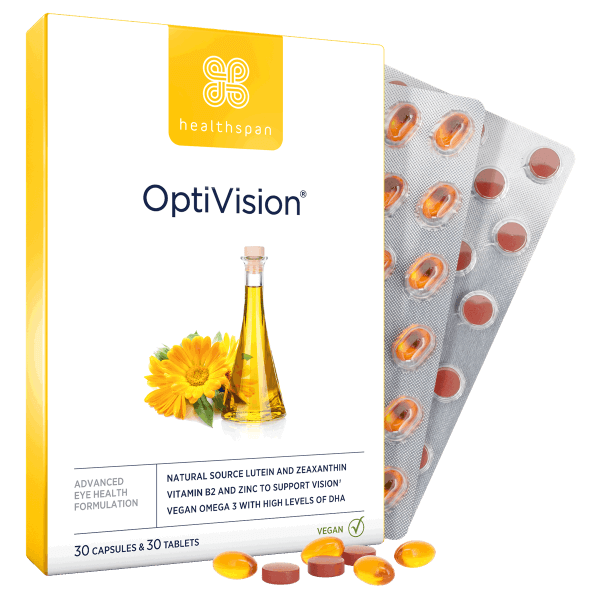The eye is delicate, complex, and needs looking after to stay in good condition. Dr Hilary Jones outlines the eye health conditions to look out for, and what you can do to maintain good eyesight for longer.
🕒 6 min read
The eye is an incredible and highly evolved organ. The 7 million cone cells in your retina deliver your world in brilliant technicolour. The 100 million rod cells help you see in the dark, can detect around 500 different shades of grey and can detect a burning candle in the dark up to a mile away.
They are the windows of the soul, reflecting unmistakable signs of love, emotion, excitement or fear, and their medical examination can reveal not just surface changes to the cornea, lens and conjunctiva, but also the nerve and circulatory changes in the retina that help diagnose conditions such as glaucoma, hypertension and diabetes, among many others.
These are just some of the reasons not to take eye health for granted. Our lifestyle, family history, living and working environment all play a part in our visual acuity and eye comfort, and despite increasing age inevitably leading to poorer vision, growing evidence confirms that there is much we can do to prevent problems long before symptoms begin.
Preventative eye care
Regular eye tests
Many ocular disorders are progressive, but produce no symptoms in the earliest stages. This is why regular eye checks are so important; not just to preserve visual acuity as normal ageing produces changes to our lens and retina, but to check for glaucoma, cataracts, dry eyes, macular degeneration and everything else.
Avoiding blue light
We now know that blue light emitted from LED televisions, computer monitors, smartphones and tablets can contribute to dry eye, retinal damage and age-related macular degeneration. The longer we spend in front of such screens, the greater the potential harm.
Limiting our exposure or using OLED screens and filters can help. Taking regular screen breaks at work and wearing good-quality sunglasses can protect against other damaging wavelengths of ultraviolet light, too.
Checking your diet
Lutein and zeaxanthin are antioxidant carotenoids found in the macula – the part of the retina essential for detailed central vision. These nutrients can absorb blue light, and their deficiency, along with that of omega 3 fatty acids, is closely associated with age-related macular degeneration (AMD).
Those diagnosed with AMD have 70% less carotenoid pigment in their macula than people with normal vision. Lutein and zeaxanthin are found in green leafy vegetables and yellow and orange fruit and vegetables such as sweet potato, carrots, cantaloupe, mango, apricots, broccoli, sprouts, bell peppers, and spinach.
Antioxidants are the compounds that mop up the damaging free radicals that cause the biological equivalent of rusting in the human body. Unfortunately, soil degradation and depletion, together with poor diet, mean that most of us obtain too little of these protective nutrients, making supplements from an early age an intelligent choice.

Retinex Max
'Nature's sunglasses' containing lutein and zeaxanthin
- Contains 20 mg lutein and 2,000 µg zeaxanthin
- Powerful carotenoids found in high concentrations in the eye
- Supports long-term eye health
How to help common eye disorders
Dry eye syndrome
This is the most common of all eye disorders, causing itchy, gritty, sore and reddened eyes and eyelids, along with a predisposition to blepharitis (swollen, itchy eyelids) and styes.
Air conditioning and central heating contribute, as does spending too long in front of screens. We blink 20 times less frequently when using screens, allowing the protective tear film to dry out.
Meibomian gland dysfunction (MGD) makes matters worse. These glands are situated in the eyelids, and produce the oil intended to protect the tear film by preventing evaporation. When the glands become blocked, inflamed and atrophied, the lids become sore, prone to styes and a constant sensation of burning and itching.
Fortunately the condition is reversible through the use of warm compresses, regular eyelid cleansing and intensive relief lubricant eye drops.
Recommended supplements
Sea buckthorn is rich in omega 6 ,7 and 9 fatty acids, together with vitamin A to boost mucosal function and vision in dim light. Also, Healthspan's bilberry extract is rich in flavonoids, plant-derived anthocyanidins and vitamin B2 to help reduce oxidative stress and maintain normal vision.

Omega 7 Sea Buckthorn Oil
High levels of omega 7 and rich in omega 9 fatty acids
- 190 mg omega 7 and 35 mg omega 9 fatty acids per capsule
- Added vitamin A to support skin and mucous membrane health
Age-related macular degeneration (AMD)
There are two forms of AMD: dry and wet, and both can affect one or both eyes.
Both forms of AMD lead to loss of fine visual detail, with blurred central vision, which can make everyday tasks such as driving, recognising faces, reading, watching TV or using a computer difficult or impossible. AMD is one of the leading causes of sight loss in the over-50s.
Dry AMD is the most common form, caused by gradual breakdown of the light-sensitive cells in the macula. In the wet form there is growth of blood vessels beneath the macula, with leakage and scarring.
Recommended supplements
Retinex, Retinex Max and OptiVision. The latter is the ultimate in eye health supplements, with lutein and zeaxanthin from a natural marigold source, and enriched with 250 mg DHA omega 3 and other minerals and vitamins.
The OptiVision formula is backed by the peer-reviewed published scientific results of the National Eye Institute's age-related eye disease study (AREDS), and there is increasing evidence that the earlier in life the supplement is taken, the greater the protective effect.
Cataracts
These are caused by cloudy, frosted patches in the lens of the eye, frequently requiring the need for surgery. Cataracts usually develop slowly with age, but injuries, conditions such as diabetes and exposure to ultraviolet light may accelerate the process.
Conversely, filtering sunglasses and antioxidants from a healthy diet delay those changes.
Recommended supplements
Healthspan's Retinex and Retinex Max contain lutein, zeaxanthin and vitamin B2 to help, while Optivision adds omega 3, copper and vitamins C and E.

OptiVision
Ultimate eye health complex, backed by science
- 20 mg lutein, 2,000 µg zeaxanthin
- 250 mg vegan omega 3
- Formulation backed by he AREDS eye health study
Glaucoma
This is caused by increased pressure in the fluid within the eye. This leads to damage to the nerve fibres in the retina and to the optic nerve, which transmits visual images to the brain.
Chronic glaucoma, the most common form, is usually asymptomatic until tunnel vision becomes apparent and irreversible. 5% of those over 80 are at risk, as are people with close relatives with the condition and those on steroid medication.
Recommended supplements and precautions
OptiVision and regular eye tests.
Tired, puffy eyes and wrinkles
The eyes give it all away – they cannot hide the signs of fatigue and stress. But at least you can give them a helping hand. Replenish Eye Serum contains phytoestrogens, pro-vitamin B5 and vitamin E, and is designed to lift and firm the eye area, reduce wrinkles and dark circles and reduce puffiness when applied under moisturiser.









